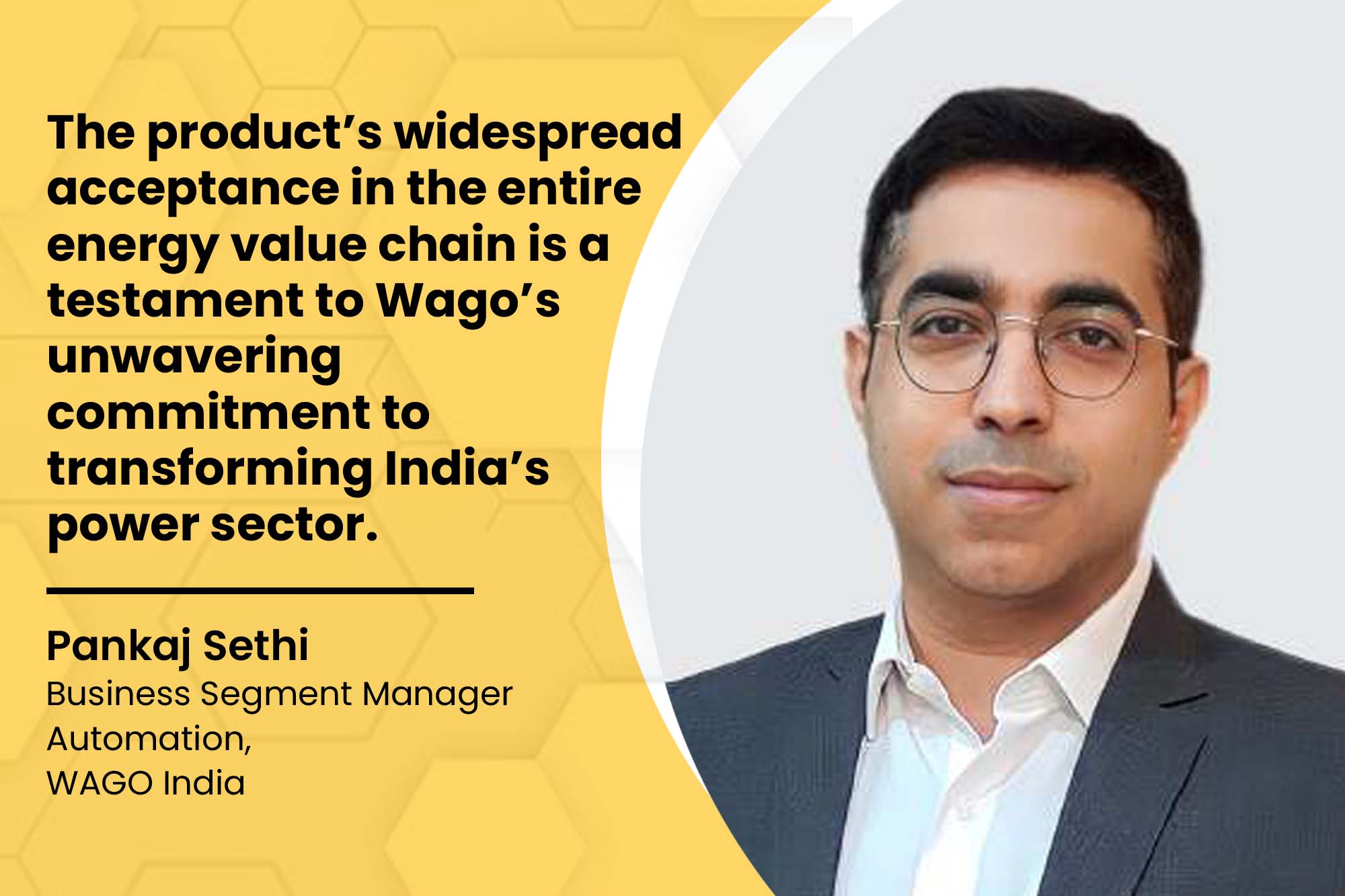Wago embeds cybersecurity compliance at the core
By EPR Magazine Editorial December 26, 2023 2:14 pm IST
By EPR Magazine Editorial December 26, 2023 2:14 pm IST

The product’s widespread acceptance in the entire energy value chain is a testament to Wago’s unwavering commitment to transforming India’s power sector.
Wago, a prominent automation and control industry player, is at the forefront of transforming India’s power sector towards sustainability. The company’s commitment is evident through innovative products and strategic collaborations, addressing key challenges for a reliable and efficient electrification infrastructure. Pankaj Sethi delves into the industry to bring insights in interaction with EPR Magazine.
Role of Wago in the transformation of the power sector
The power sector is a key focus area of Wago’s business, and commitment to environmental sustainability is deeply rooted in the company’s core values. The company’s strategic approach involves seamlessly integrating these aspects to cultivate sustainable power networks, both globally and for India.
All the automation and control products are meticulously developed, with sustainability strategy positioned at the forefront. Unquestionably, the widespread acceptance of automation products in the entire energy value chain is a testament to Wago’s unwavering commitment to transforming India’s power sector.
The significant installation base includes various automation products such as RTUs, FRTUs, SCADA controllers, grid gateways, PPCs, and ethernet switches. These installations span multiple renewable energy generating plants, power distribution networks, smart and energy-efficient buildings, and industrial infrastructure across India.
Improving reliability in the power distribution system
India has an extensive power distribution system, yet, except for a few major cities, much of it operates on a conventional setup that lacks automation or remote monitoring. Furthermore, Indian DISCOMs face many challenges, including high AT&C losses, financial constraints, an ageing workforce, and issues like power theft. These challenges collectively hinder DISCOMs from providing a reliable power supply to consumers. The deployment of automation technologies, such as substation automation in primary substations, secondary automation in the power distribution network, centralised ADMS systems, and automated metering technologies, emerges as a viable solution to address these challenges.
Integrating such systems enables better monitoring, swift fault detections, localisations and restoration, improved asset monitoring and maintenance forecasting, energy audits, and a chronological event database for root cause analysis and corrective measures. The enhanced operational efficiency and reliability achieved through these measures are reflected in improved indices such as SAIFI, SAIDI, AT&C Losses, and more.
Public-private collaborationPublic-private collaborations have consistently played a pivotal role in nation-building across various domains, and the field of automation systems for electrical infrastructure is no exception. These collaborations leverage the strengths of both public and private entities, fostering opportunities for innovation and efficiency.
Typically, private entities take the lead in developing innovative technologies, while the public sector contributes through investments, articulating specific requirements, and establishing regulatory frameworks. This collaborative approach accelerates the development and adoption of modern technologies in automation, thereby strengthening the electrical infrastructure. The concerted efforts of these sectors contribute to the creation of a dynamic ecosystem that drives technological advancements and ensures the resilience of the nation’s electrical infrastructure.
Cybersecurity concerns
Cybersecurity is no longer a mere buzzword but a tangible challenge for nations worldwide, including India. With our increasing reliance on power networks for daily tasks, transportation, financial systems, and national security, cyberattacks on these networks pose a significant risk of bringing nations to a standstill.
Recognising these challenges, energy regulators are becoming increasingly strict in enforcing compliance with various national and international cybersecurity standards. Wago acknowledges the critical importance of such compliances for power networks. Consequently, adherence to cybersecurity standards is integrated into the core of the product development strategy.
The company also recognises that cybersecurity frameworks must remain dynamic to stay ahead of emerging threats. Therefore, Wago’s automation products are designed to evolve continually in compliance with the latest cybersecurity standards. This proactive approach ensures that the products effectively protect power sectors from potential intrusions, aligning with the ever-changing landscape of cybersecurity threats.
Spokesperson: Pankaj Sethi, Business Segment Manager – Automation, WAGO India
We use cookies to personalize your experience. By continuing to visit this website you agree to our Terms & Conditions, Privacy Policy and Cookie Policy.